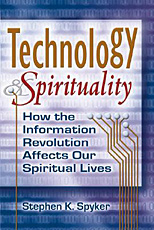"When I see people yakking endlessly on cell phones, mostly I'm just annoyed. But sometimes I think back to my experience on the trail when I didn't have a cell phone and I feel a little sorry for these people. How long could they go without calling others and giving them an update on their lives? Perhaps they'll never find out. Sometimes I feel like I'm watching everyone around me shoot up heroin, unaware of their own addiction, and having no idea what they are missing out on or how empty their lives are becoming as they fill every waking minute with minutiae.
"Of course, there is justification for a lot of this chatter. It's often part of our job or our social obligation to 'stay in touch' or 'network' with colleagues or clients. And that's the part I find so frightening. More and more, there is an expectation that we stay constantly connected. I have had people become indignant or suspicious when I've turned off my cell phone. (I've since gotten rid of it entirely.) Others have gotten angry or worried when I haven't responded to e-mail quickly enough to suit them, and it has become increasingly acceptable for employers to expect employees to be reachable '24/7.' Thanks to the information revolution, we are living in a hyperconnected age, and I'm convinced the effect is toxic to our spiritual well-being.
"Meaningful connections with loved ones and with our higher power are important and good. It serves us well if we can develop and deepen these connections, engage them routinely and often. But shouldn't we also be looking for ways we can 'disconnect' from the minutiae of the world, resisting our inclination to lean on others in an effort to distract us from the routine joys and sorrows of life alone in our own skin?
" 'Self-reliance' is a sin in some religious traditions, the implication being that you shouldn't try to get through life on your own resources, but should rely instead on God. But that doesn't mean you shouldn't ever have to face life's little challenges alone. Going into the desert, into the wilderness, being 'alone' with God, is one of the oldest and most central parts of all religious and spiritual traditions; it is an essential part of the religious life. Though the desert/wilderness experience archetype is generally a one-time, life-transforming event, most religious traditions find some way of bringing a piece of this critical experience into routine religious life. The practice of fasting during Lent is one example. Another is the practice, common among Catholics, especially those with a religious vocation, of taking a silent retreat, refusing to speak or communicate with others for an extended period of time.
"So what should we do about all this hyperconnection? Here's my bottom-line advice: spend some time in the wilderness; go there often; avoid, to the extent possible, any technology that won't allow you to be there. How that translates into your own life is for you to decide. You could take me literally, strap on a pack, and head off into the mountains or woods, or you could take it as a metaphor. Either one, or both, is fine. My real concern is that as you evaluate technologies, deciding what impact they might have on your spiritual life, you consider how the connections they enable can be a two-edged sword; they can be life-giving, but they can also place restrictions on our ability to be alone with God.”
